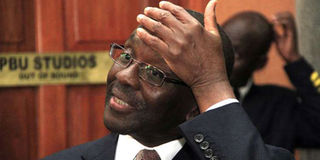Attention turns to who will be picked for Chief Justice post

This photo dated June 15, 2016 shows Chief Justice Willy Mutunga at Senate in Nairobi. PHOTO | DIANA NGILA | NATION MEDIA GROUP
What you need to know:
Kenya’s civil society is backing Makau Mutua, with Smokin Wanjala as its fallback
But Githu Muigai’s merciless grilling of Mutua on the presidency should be instructive.
Conservatives and the anti-tribe-based politics in and out of government fall in Alnashir Visram’s column.
The high principle-minded line up behind Jackton Ojwang.
As the interviews for Kenya’s next Chief Justice ended last week and attention shifted to who will be the pick of the Judicial Service Commission (JSC) on Thursday, most observers appeared to think the race would turn on the academic and professional qualifications of the applicants.
That’s not surprising. Prof Makau Mutua, the second last interviewee, is not only a don at an American university, an analyst and publisher with a massive and stellar resume, and a scholarly mien to match, but he also brought out the best in interviewing skills in Attorney-General Prof Githu Muigai on the JSC panel.
The last interviewee, Prof Jackton Boma Ojwang, a Supreme Court Justice, was not only Kenya’s first sitting judge to be conferred with a Doctor of Laws degree, but is also the proud holder of a higher doctorate. This is awarded in recognition of a published work and merit in a particular field and especially for its original and significant contribution to knowledge.
Before Prof Mutua and Prof Ojwang, there had been Dr Smokin Wanjala, a Supreme Court Justice and former University of Nairobi don. He held Kenyans and the interviewing panel in rapt attention with his eloquence, air of authority, mastery of his subject and seeming to think on his feet with ease. Wowed, Kenyans on social media immediately installed Dr Wanjala the red hot favourite to succeed retired Dr Willy Mutunga.
ACADEMIC QUALIFICATIONS
But as JSC chairperson and panel chair Prof Margaret Kobia observed as the interviewing took off, the qualifications for Chief Justice could not be limited to academic and professional qualifications. The panel has certainly been looking at leadership and managerial acumen, temperament, integrity, experience on the bar and or bench, cases they have handled, vision for the place and standing of the Supreme Court in Kenya’s judicial system, the place of the Judiciary vis-a-vis other arms of government and the swift service of justice to Kenyans.
As the interviews wound down, most observers seemed to have forgotten that weeks earlier, Justices Alnashir Visram, Mbogholi Msagha, David Maraga and Roselyne Nambuye had appeared before the panel much earlier. They came across as judicial officers with vast day-to-day experience in Kenya’s courts.
Many more may not have remembered that Kisii-born Visram of the Court of Appeal, by appearing first before the panel, laid out his vision for his rivals to see in advance of their interviews which, then, served as the benchmark for their own and also gave them a glimpse into the lines of questioning by the panel. Public attention on Justice Visram was intense from the word go. First, because he could have been Chief Justice in 2009. He was nominated for the job by President Kibaki. But this came to nought when then Prime Minister Raila Odinga cried foul, saying the President had not adequately consulted him and the nomination was challenged in court as flawed.
VISRAM APPLIED
Then he applied for it in the 2011 cycle that eventually settled on Dr Mutunga. Second, established media analysts of legal affairs ranked Justice Visram high and in good stead of becoming CJ. But, they also labelled him anti-media freedom and a defender of the high and mighty. Third, Justice Visram’s application brought to the fore his libel case against the Standard. The judge blames the newspaper’s 2011 “Unfit for justice” headline for poisoning the interviewing panel and costing him the CJ’s job. He was tagged anti-media freedom and defender of the mighty for awarding Mr Nicholas Biwott Sh30 million in a defamation judgment. That remains the highest figure ever awarded in Kenya.
But, coincidence or providence, just as the interviews for the CJ’s job got under way, Lady Justice Roselyne Aburili found the Standard guilty of defaming Justice Visram and awarded him Sh26 million in damages. The timing, the five-year wait notwithstanding, suited Justice Visram perfectly. He saw it as clearance of his name on claims of dishonesty and perjury made by the paper using a discredited Law Society of Kenya document.
This makes for a four-horse race in which integrity and Parliament’s lying in wait will be crucial factors for the JSC. Kenya’s civil society is backing Prof Mutua, with Dr Wanjala as its fallback. But Prof Muigai’s merciless grilling of Prof Mutua on the presidency should be instructive. Conservatives and the anti-tribe-based politics in and out of government fall in Justice Visram’s column. The high principle-minded line up behind Prof Ojwang.





